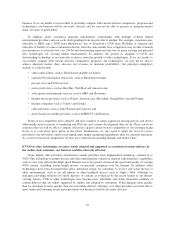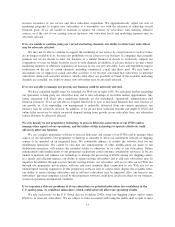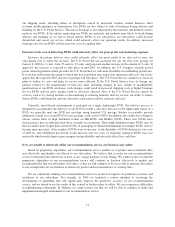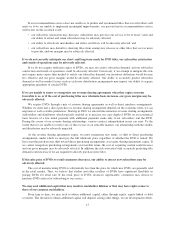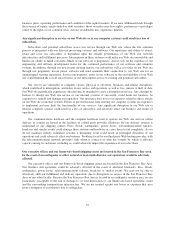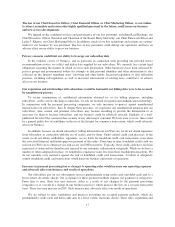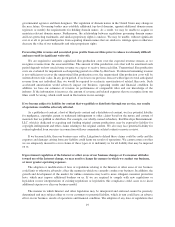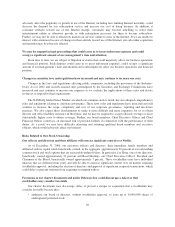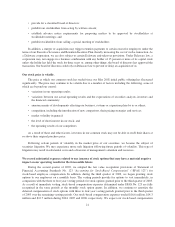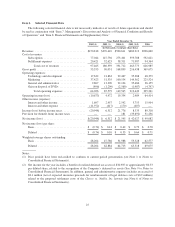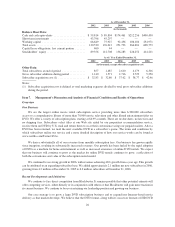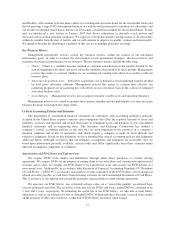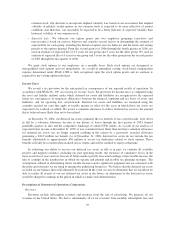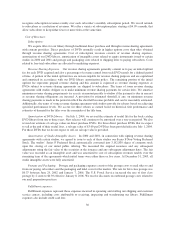NetFlix 2006 Annual Report Download - page 28
Download and view the complete annual report
Please find page 28 of the 2006 NetFlix annual report below. You can navigate through the pages in the report by either clicking on the pages listed below, or by using the keyword search tool below to find specific information within the annual report.adversely affect the popularity or growth in use of the Internet, including laws limiting Internet neutrality, could
decrease the demand for our subscription service and increase our cost of doing business. In addition, if
consumer attitudes toward use of the Internet change, consumers may become unwilling to select their
entertainment online or otherwise provide us with information necessary for them to become subscribers.
Further, we may not be able to effectively market our services online to users of the Internet. If we are unable to
interact with consumers because of changes in their attitude toward use of the Internet, our subscriber acquisition
and retention may be adversely affected.
We may be engaged in legal proceedings that could cause us to incur unforeseen expenses and could
occupy a significant amount of our management’s time and attention.
From time to time, we are subject to litigation or claims that could negatively affect our business operations
and financial position. Such disputes could cause us to incur unforeseen expenses, could occupy a significant
amount of our management’s time and attention and could negatively affect our business operations and financial
position.
Changes in securities laws and regulations have increased and may continue to increase our costs.
Changes in the laws and regulations affecting public companies, including the provisions of the Sarbanes-
Oxley Act of 2002 and recently-enacted rules promulgated by the Securities and Exchange Commission, have
increased and may continue to increase our expenses as we evaluate the implications of these rules and devote
resources to respond to their requirements.
The NASDAQ Global Select Market, on which our common stock is listed, has also adopted comprehensive
rules and regulations relating to corporate governance. These laws, rules and regulations have increased and will
continue to increase the scope, complexity and cost of our corporate governance, reporting and disclosure
practices. We also expect these developments to make it more difficult and more expensive for us to obtain
director and officer liability insurance in the future, and we may be required to accept reduced coverage or incur
substantially higher costs to obtain coverage. Further, our board members, Chief Executive Officer and Chief
Financial Officer could face an increased risk of personal liability in connection with the performance of their
duties. As a result, we may have difficulty attracting and retaining qualified board members and executive
officers, which would adversely affect our business.
Risks Related to Our Stock Ownership
Our officers and directors and their affiliates will exercise significant control over Netflix.
As of December 31, 2006, our executive officers and directors, their immediate family members and
affiliated venture capital funds beneficially owned, in the aggregate, approximately 30 percent of our outstanding
common stock and stock options that are exercisable within 60 days. In particular, Jay Hoag, one of our directors,
beneficially owned approximately 21 percent and Reed Hastings, our Chief Executive Officer, President and
Chairman of the Board, beneficially owned approximately 7 percent. These stockholders may have individual
interests that are different from yours and will be able to exercise significant control over all matters requiring
stockholder approval, including the election of directors and approval of significant corporate transactions, which
could delay or prevent someone from acquiring or merging with us.
Provisions in our charter documents and under Delaware law could discourage a takeover that
stockholders may consider favorable.
Our charter documents may discourage, delay or prevent a merger or acquisition that a stockholder may
consider favorable because they:
• authorize our board of directors, without stockholder approval, to issue up to 10,000,000 shares of
undesignated preferred stock;
20


